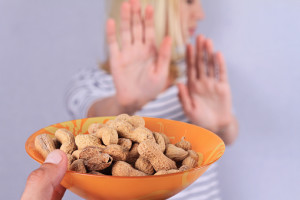
Posted on : September 12th, 2016
 When grappling food allergies, the simple act of eating can be scary. You never know what may have peanuts, tree nuts, or I-Need-My-Epi-Pen nuts in the mix. It’s completely reasonable to want to know more about where your food comes from, and whether or not you can trust the brand with the potential for an allergic reaction. We want to give you an inside look at allergies, and how you can safely enjoy our products (including the gluten-free options).
When grappling food allergies, the simple act of eating can be scary. You never know what may have peanuts, tree nuts, or I-Need-My-Epi-Pen nuts in the mix. It’s completely reasonable to want to know more about where your food comes from, and whether or not you can trust the brand with the potential for an allergic reaction. We want to give you an inside look at allergies, and how you can safely enjoy our products (including the gluten-free options).
There are peanuts and there are tree nuts. Peanuts are not, in fact, nuts. They are technically beans classified as legumes. You can be allergic to peanuts, but not other legumes (like soy beans or peas). Tree nuts are just that: nuts from a tree. Here at Maisie Jane’s, we don’t offer peanut products. We do, however, offer a stellar repertoire of tree nuts: almonds, cashews, walnuts, pecans, pistachios, and hazelnuts. Our tree nuts are sold as snacks, candies, and nut butters.
An allergic reaction happens when your immune system spots something in your body it doesn’t recognize, and it panics. With peanuts and tree nuts, it’s certain proteins your body makes and/or receives when you come into contact with the nut. Your immune system sees these proteins as intruders and sends out warriors to capture them. When this happens you can feel nauseous, itchy, and even experience swelling that ranges from moderate to life-threatening. Each person is unique in their allergies; this includes what type of contact causes a reaction.
There are three different degrees of contact: Direct Contact, Cross-Contact, and Inhalation.
Direct Contact is essentially a full-on assault. You’ve eaten or touched the offending entity and now it’s go-time.
Cross-Contact is touching or ingesting something that had contact with the peanut/tree nut you’re allergic to. It can be as slight as almonds in a Hershey bar traveling down the same machinery track as the peanuts from M&Ms, or it can be as hardcore as almonds and peanuts bumping uglies in the same container while they wait to be rinsed prior to processing.
Inhalation is a finicky type of contact. If you inhale any semblance of dust from the legume/tree nut you’re allergic to, you can bank on a reaction. Aerosol peanut oil, perfumes with almond oil, walking past a walnut orchard where the trees were freshly harvested…you see what we’re getting at.
Our nut butters do not come into contact with peanut products, even on the processing equipment. You don’t have to worry about cross contact or direct contact, and if you’d like to come tour our orchards you are not in danger of inhaling peanut allergen. We pride ourselves in creating a safe place for people with certain nut allergies to retreat to.
If you’re allergic to gluten, you can still eat some of our products! Most of our flavored nuts, fruits, honey, and nut butters are gluten free. If you have any doubts, we typically list it in the product description section next to each product in the online store. If you have questions, please don’t hesitate to reach out to us. Your health is important to us; we want you to have all the facts to make an informed decision about what you eat.
There is speculation that certain synthetics used as pesticides on peanuts and tree nuts can contribute to the likelihood of developing an allergy to peanuts or tree nuts. Maisie Jane’s has both certified organic products and natural products. The organic products are guaranteed there are zero chemicals used.
In regards to natural products, a grower has many choices when it comes to farming the orchards:
At Maisie Jane’s, we’re very conscious of our farming choices and practices for our non-organic orchards, choosing natural fertilizers, integrated pest management practices, and cutting grasses to control weeds. We look at the big picture and strive to keep the orchard in harmony so there’s minimal impact on the natural processes. Our intention is to keep the land healthy and fertile for generations to come.
We believe avoiding chemical spray can bring people to a level of health they’ve forgotten they can attain. That someone with a food allergy, who now has children, might be able to give their children what they couldn’t have because there isn’t pesticide residue on the nut with the potential to trigger an immune response.
We are very conscientious of what we feed people: our nut butters never come into contact with peanuts, and our trees/nuts are not exposed to pesticides, insecticides, or herbicides. We choose a natural path for the environment, and for the well-being of our customers.
Our practices impose a great deal of care, caution, and protocol to ensure you are not at risk for accidental cross-contamination. We strive to ensure the food you receive from us is as clean as it can be. We worry about your diet so that you don’t have to. You aren’t just a customer, a reader, or a fan, to us. You’re a human being on the other end of this, deserving to live in a world where you can enjoy food without fear.
If you’d like to take a look at what we bring to the table, check out our online store – and rest easy knowing our products are made with the same level of care you’d use with your own family.